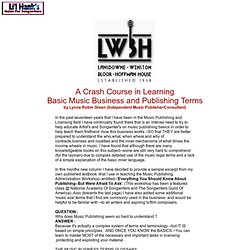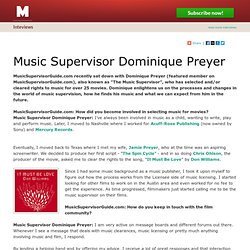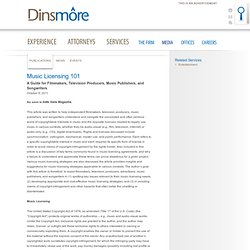

** Music Biz Vocabulary. How to Copyright a Song. Edit Article Registering Your Song OnlineRegistering Your Song by MailKnowing What to Avoid Edited by Dman0875, Jack Herrick, Ben Rubenstein, Tom Viren and 64 others Under international law, copyright is the automatic right of the creator of a work. This means that as soon as you write down a song or make a recording, it's copyrighted. In order to enforce the copyright, though, you'll need to be able to prove your ownership. Ad Steps Method 1 of 3: Registering Your Song Online 1Make a copy of your song. Method 2 of 3: Registering Your Song by Mail 1Obtain form CO.[4] You can either download it from the US Copyright Office website or call the office at (202) 707-3000 and request that the forms be sent to you.
Method 3 of 3: Knowing What to Avoid 1Avoid poor man's copyright. Tips Warnings. Flashcard Study. Publishing Terms Crash Course. In the past seventeen years that I have been in the Music Publishing and Licensing field I have continually found there that is an intense need to try to help educate Artist's and Songwriter's on music publishing basics in order to help teach them firsthand -how this business works --SO that THEY are better prepared to understand the who,what, when where and why of contracts,licenses and royalties and the inner mechanisms of what drives the income wheels in music.

I have found that although there are many knowledgeable books on this subject--some are still very hard to comprehend (for the layman)-due to complex detailed use of the music legal terms and a lack of a simple explanation of the basic inner language. In this months new column I have decided to provide a sample excerpt from my own published textbook -that I use in teaching the Music Publishing Administration Workshop--entitled--'Everything You Should Know About Publishing- But Were Afraid To Ask'. 4. 6. 12. 15. 16. 18. 19. 21.
Music Supervision - Interview. MusicSupervisorGuide.com recently sat down with Dominique Preyer (featured member on MusicSupervisorGuide.com), also known as “The Music Supervisor”, who has selected and/or cleared rights to music for over 25 movies.

Dominique enlightens us on the processes and changes in the world of music supervision, how he finds his music and what we can expect from him in the future. MusicSupervisorGuide.com: How did you become involved in selecting music for movies? Music Supervisor Dominique Preyer: I’ve always been involved in music as a child, wanting to write, play and perform music. Later, I moved to Nashville where I worked for Acuff-Rose Publishing (now owned by Sony) and Mercury Records. Eventually, I moved back to Texas where I met my wife, Jamie Preyer, who at the time was an aspiring screenwriter. Since I had some music background as a music publisher, I took it upon myself to figure out how the process works from the Licensee side of music licensing.
Taxi TV - Mondays at 4PM. Watch without ads Ustream © Search Log in / Sign up With Facebook (faster) Log in or sign up with Facebook See what your friends like and watch, get awesome recommendations Instant login, no passwords or With email or username Forgot your password?

Don’t have an account? Go live! Find more broadcasts Expand Video TAXI TV - Songwriting and Music Business Show Follow Following Unfollow 2,143 followers Watch without ads Flag this content Please select your reason for flagging this video as inappropriate from the dropdown below. Introduction to the Business of Songwriting. Music Copyright, Publishing, and Contracts. Music Licensing 101. As seen in Indie Slate Magazine.

This article was written to help independent filmmakers, television producers, music publishers, and songwriters understand and navigate the convoluted and often perilous world of copyrightable interests in music and the requisite licenses needed to legally use music in various contexts, whether they be audio-visual (e.g., film, television, internet) or audio-only (e.g., CDs, digital downloads). Rights and licenses discussed include synchronization, videogram, mechanical, master use, and public performance. Each refers to a specific copyrightable interest in music and each requires its specific form of license in order to avoid claims of copyright infringement by the rights holder. Also included in this article is a discussion of key terms commonly found in music licensing agreements, and why a failure to understand and appreciate these terms can prove disastrous for a given project.
Music Licensing The Synchronization Right and License A. B. C. D. E.